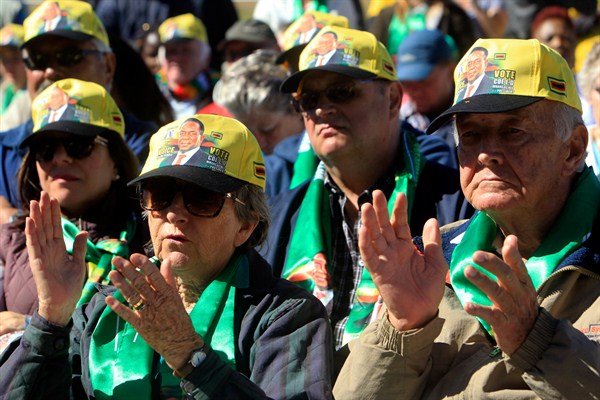One of the promises Emmerson Mnangagwa made after becoming Zimbabwe’s president in late 2017 was to reach a compromise on one of the most divisive issues in the country: how to compensate the estimated 4,500 white farmers whose property was violently expropriated under Robert Mugabe. But Mnangagwa’s attempts to take a more conciliatory tone risk creating new divisions and reopening old wounds. Mnangagwa is trying to strike a nearly impossible balance, treating the land seizures under Mugabe’s so-called fast track land reform program as “irreversible” while offering “appropriate compensation” to dispossessed white farmers, but only for improvements they made to the land and infrastructure they installed before the land was seized.
Mnangagwa considers this blend of principle and pragmatism to be a logical extension of his post-Mugabe reforms, through which he hopes to mend fences with Western countries that largely broke off ties after the land seizures started in 2000. Better ties will help rehabilitate Zimbabwe internationally and draw foreign investment back to the country to revive an economy that collapsed under Mugabe. Unfortunately for Mnangagwa, however, things are rarely so simple, and several obstacles still stand in the way. It will be difficult for him to straddle these divisions and satisfy each of the constituencies with an interest in the outcome: the former farmers themselves, the ruling ZANU-PF party and the West.
Mnangagwa projected a new image of himself and the ruling party when he assumed power after the military coup against Mugabe in November 2017. Gone was the belligerence and hostility toward Zimbabwe’s white community and European states, particularly Britain, that had defined the Mugabe presidency. Mnangagwa also appeared reluctant to view all political issues through the lens of the liberation struggle, unlike other ossified regimes in Southern Africa. He adopted the technocratic language of reform, seemingly designed to dilute the ideological content of his domestic agenda and foreign policy. He was aware that a constructive reengagement with the West would require a new approach in which the government acknowledged its respect for property rights, agreed to compensation packages for displaced white farmers and committed to a new form of politics. Underpinning this new approach was a hard-headed economic realization that Zimbabwe could not look purely to China for its economic redemption, as Mugabe had attempted to do, but needed substantial infusions of Western capital.

